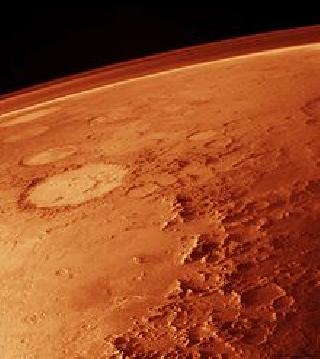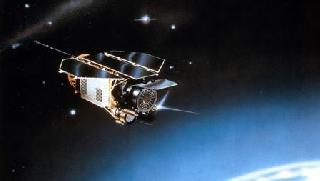
WASHINGTON (PTI): Scientists have discovered that the upper atmosphere of Mars contains up to a hundred times more water than previously thought, a finding they say could change our understanding of the Martian climate.
The discovery, published in the journal Science, also suggested that the Red Planet might have contained lot more water in its early history, said the researchers.
Using data from the European Space Agency's Mars Express probe and NASA's Mars Reconnaissance Orbiter, an international team of astronomers determined that water in the upper Martian atmosphere undergoes a process known as supersaturation, which astronomers thought could not occur on the dry, dusty planet.
Under most climate conditions, water vapour coalesces around dust and particles in the air. When such dust is sparse, climate models have long assumed that the excess water in the atmosphere on Mars is then converted to ice.
But data from Mars Express' SPICAM instrument shows otherwise.
"Our observations show that as much as 10 to a 100 times more water vapour can subsist in a state of supersaturation," Franck Montmessin, from the Laboratoire Atmospheres, Milieux, Observations Spatiales (LATMOS) in France, was quoted as saying by LiveScience.
Montmessin is part of the team led by Maltagliati Luca, also at LATMOS, which studied the data.
When the atmosphere contains little to no dust, however, water cannot use it as a base. Instead, the water must remain in the vapour stage in a state known as supersaturation.
"Existence of supersaturation has profound consequences for the migration and further persistence of water everywhere on the planet," Montmessin said.
Since the conditions on Mars were thought to impede supersaturation rather than encourage it, the present climate models do not include the process and will need to be revised.
The team analysed an especially cold season of spring and summer in the northern hemisphere on Mars. But the changed perspective on water vapour around the North Pole has consequences for the entire planet.
"Every summer, when the sun shines at the North Pole, water sublimes, or evaporates, from the surface and fills the atmosphere with moisture," Montmessin explained. "Seasonally sublimed water from the north pole allows the global amount of water contained in the atmosphere to double."
While most of that water returns to the North Pole again in the winter, winds blow some of it south. In the meantime, some of the South Pole's water moves north.
And some of the water leaves the planet entirely. "It is believed that Mars has lost a substantial fraction, if not a majority, of its primordial water by escape processes to space," Montmessin said.
Only a small fraction of the water reaches the upper level of the atmosphere, where it is broken up into hydrogen and oxygen atoms that escape into space.
But, if more water is present, then it means a larger quantity is able to escape, and that means more water could have been present in the Red Planet's past than previously thought, Montmessin said.
"Now, let's imagine that such a process has gone on and on for billions of years, and you might appreciate the resulting net loss of water for Mars," he added.
 Next Article
Next Article













The Indian Air Force, in its flight trials evaluation report submitted before the Defence Ministry l..
view articleAn insight into the Medium Multi-Role Combat Aircraft competition...
view articleSky enthusiasts can now spot the International Space Station (ISS) commanded by Indian-American astr..
view article